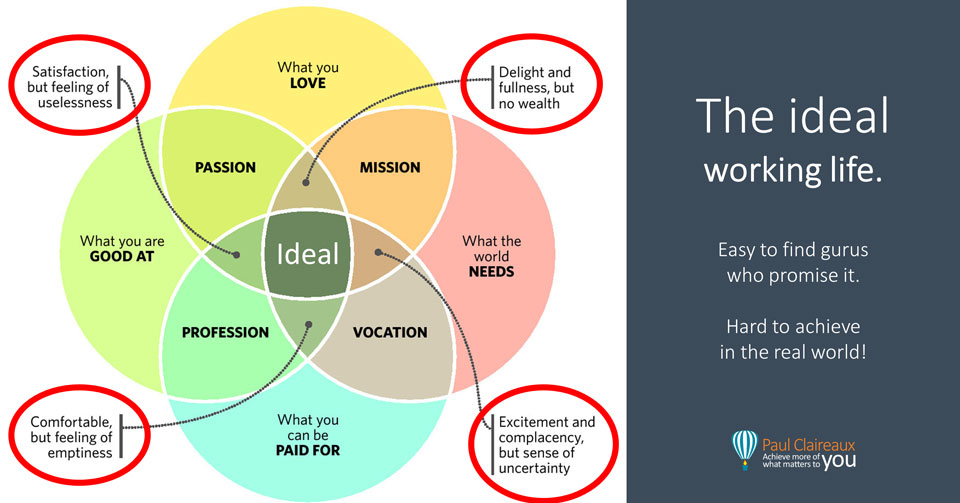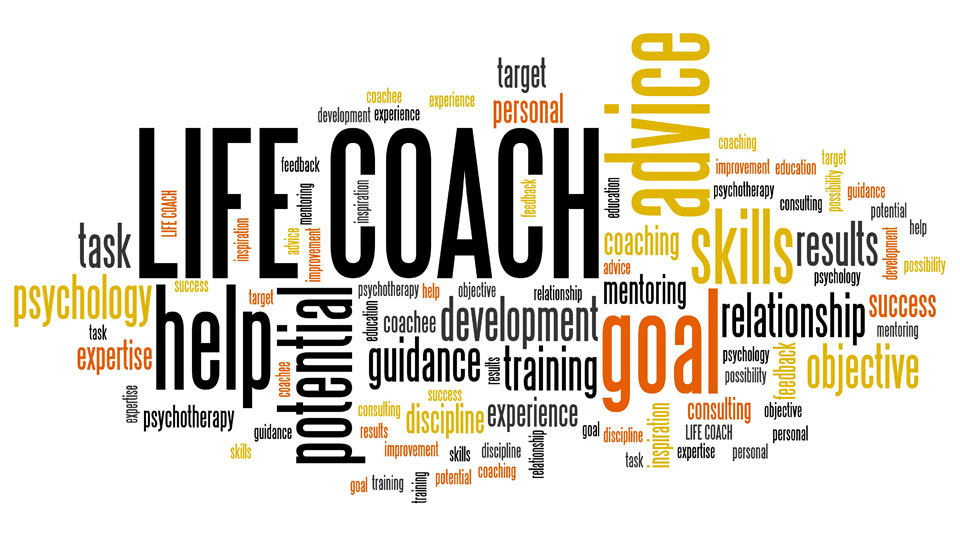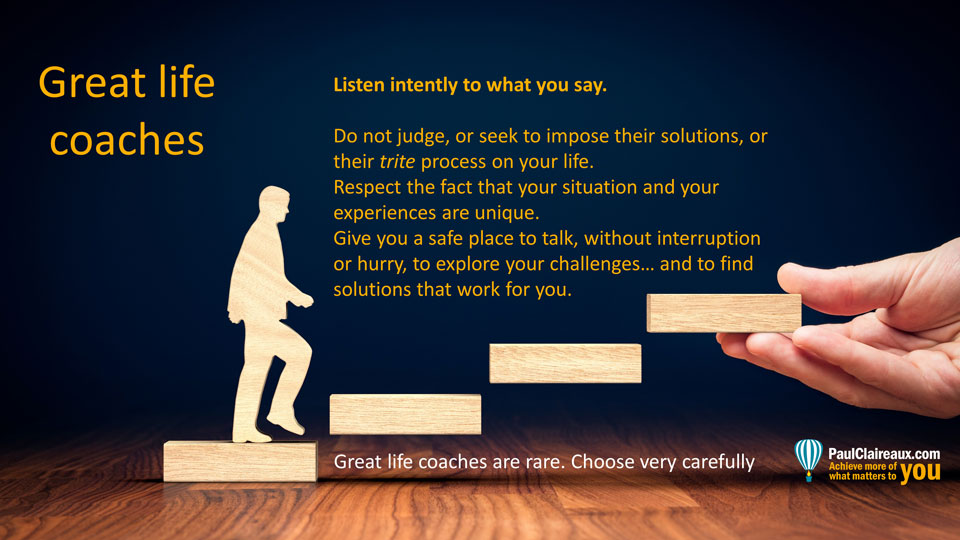Do you really need a coach?
and are they worth paying for?

I like this ‘IDEAL’ work concept – but it’s a high bar to reach.
And we must take care not to beat ourselves up when we’re not in that central zone – which is likely to be much of the time.
Also be aware that this Venn diagram is often wrongly used to describe the Japanese idea of IKIGAI, which is a very different and easier state to reach, as you can learn here.
The question is – do you really need a coach?
Do, you need a coach to help you find your ‘sweet spot’ in life?
Well, according to Bill Gates (founder of Microsoft) :
Everyone needs a coach.
It doesn’t matter whether we’re a basketball player, a tennis player, a gymnast or a bridge player.
We all need people who will give us feedback.
That’s how we improve.
And Eric Schmidt, CEO of Google says:
Every famous performer has a coach.
Somebody who can watch what they’re doing and say, ‘is that what you really meant?’
A coach gives you perspective.
And that’s the one thing none of us are good at, seeing ourselves as others see us.
So a coach really helps.
So, coaching can help but do you need to pay for it?
Well, that depends.
A friend or family member might be able to help you achieve what you want.
However, the value of their help will be a function of:
- The time they can devote to supporting you.
- Whether they have the experience and especially the listening skills to coach you.
- Whether they have the knowledge to help you progress in the area you’re working on.
If they can’t give you all three of these things, then paying for some time with a good professional coach could pay dividends.
It’s also worth knowing that simply sharing your goals, with family and friends, is unlikely to help you achieve them.
I know that sounds counter-intuitive, especially given what you might have heard from so many ‘gurus’… but the evidence shows that it’s generally counterproductive.

So, what should you look for in a coach?
There are as many views on this as there are coaches in the world.
And there are hundreds of thousands of those.
Dan Coyle, best-selling author of ‘The Talent Code’ has a great answer to this question – and suggests you should:
Choose someone who listens intently to you.
Someone who:
Genuinely wants to help you figure out what you want
Loves to teach the fundamentals of what you’re learning about.
Can give you short, clear insights.
Someone with plenty of real-life experience.
That’s a great checklist – right?
Who to avoid as a coach:
Coyle’s guidance on this is also invaluable, and I totally agree with what he says here.
Avoid anyone who reminds you of a courteous waiter
The truth is that people who want to keep you comfortable and happy are useless as coaches.
Those people are ten a penny – they offer you nothing but ‘likes’ on your social media posts.
So, the only thing they help you build is an “echo chamber”!
 We seldom learn much from our comfort zone – we need some discomfort for any magic to happen!
We seldom learn much from our comfort zone – we need some discomfort for any magic to happen!
 So, there are two good reasons to not rely on a friend or family member as your coach.
So, there are two good reasons to not rely on a friend or family member as your coach.
There’s a good chance that they’ll either be too ‘soft’ or too ‘hard’ on you.
Either way, they’ll struggle to be balanced or objective, and that’s not helpful.
Let’s face it – we have too much ‘history’ with our friends and family to expect them to manage that!
Whatever you do, choose a coach who encourages you to get out of your comfort zone – because you must do that to achieve more of the things that really matter to you.
That said, be sure to find someone capable of nudging you nicely – with compassion and good humour!
Work with someone who can leave you with valuable Insights into what more you can do for yourself – *and* a smile at the end of each conversation.
Bad-tempered dragons and pushy automatons are best avoided.
Sadly, too many of them end up as coaches!
Choose someone who listens.
Whatever you’re aiming for, you need someone who can sit quietly and genuinely listen to your concerns and your ideas… as well as nudging you to take more action when you need it.
You won’t have any problem finding someone who will talk at you – with their preconceived ideas about what you should be doing.
But that’s not coaching – and let’s be clear, over the long term, the ‘should’ word will likely hold you back.
Any good Psychologist will tell you that.
The sad truth is that very few people know how to listen.
So, you need to watch out for that and change your coach if yours can’t listen.
The ability to listen intently, without judgement, is the most valuable thing a coach can do.
Here’s what else I think you’ll need:

A great coach will work with you as an equal, a friend – and here’s a great quote to sum up their approach.
This is just magic, don’t you think?
A great coach is your ‘sounding board’…
They’ll give you a safe place to ‘explore’ and talk through your challenges and ideas for your life… and that’s where the magic happens.
It’s in those conversations that you can discover what really matters to you: what you want for yourself and your loved ones for the medium and longer term.
Over to you – what do you want to achieve?
Do you want to get better at what you do now?
Or do you want to start something completely NEW?
If you’re a business owner, would you like to get better at marketing and selling your services?
Or if you’re employed, could you use a promotion – or an entirely new job?
Would you like to start (or spend more time) doing the things you’re more passionate about?
- To write a book?
- To start your own business?
- To make your existing business more successful?
- To build a fund to escape from work altogether?
- To travel more?
Or to simply find more time to relax and appreciate what you have?
Whatever you want, you will find it easier to achieve, and it will cost you a lot less money – if you have a competent coach guiding and supporting you.
How might I help
Well, if you want to change things in your life but are unsure where to start, my form of life coaching could be a game-changer for you.
You will not waste your time ‘stressing’ to ‘overcome’ weaknesses or to get ‘good’ at stuff that doesn’t interest you.
Instead, you’ll discover your true strengths and find ways to work with them.
If we worked together, I would help you to:
- Understand your strengths – and build upon them.
- Define your goals in areas that interest you.
- Transform your ideas into workable plans.
- Challenge and support you to achieve them.
If you want, I can also help you to understand the fundamentals of personal finance – so you’re able to make better decisions in that area, too – but we don’t need to work on that stuff if you don’t want to.
That’s only a small part of what I do.
The agenda we’d work to – is created by YOU
This is simply about helping you explore and achieve more of what really matters to you.
In fact, I believe so strongly in those words that I’ve put them in my logo.
Do you need help?
If you want coaching help, someone to discuss your ideas with and challenge you before making big decisions, then go for it.
Just be careful who you work with. The abilities (and fee levels) of coaches vary a lot, and there are some air-headed-chancers out there.
So, there you have it.
That’s what I (and Dan Coyle) think good coaching looks like.
And if you think this approach might be what you need, let’s talk.
Either way, I hope this post helps you on the next stage of your journey.
And thanks for dropping in
Paul
Please email me at hello@paulclaireaux.com if you’d like to explore this service further.
And if you’d simply like more ideas to achieve more in your life and make more of your money, sign up for my newsletter
 Also, for more frequent ideas – and more interaction – follow me on Twitter or Linked In. Links below
Also, for more frequent ideas – and more interaction – follow me on Twitter or Linked In. Links below


Discuss this article